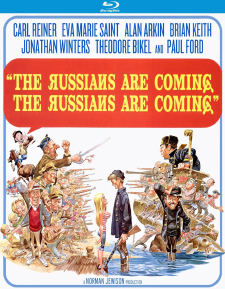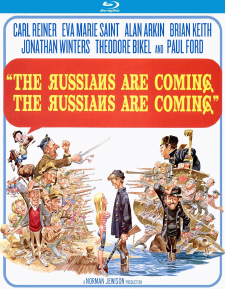Russians Are Coming, the Russians Are Coming, The (Blu-ray Review)

Director
Norman JewisonRelease Date(s)
1966 (February 10, 2024)Studio(s)
The Mirisch Company/United Artists (Kino Lorber Studio Classics)- Film/Program Grade: A
- Video Grade: A-
- Audio Grade: A-
- Extras Grade: A-
Review
The usually reliable Leonard Maltin’s Movie Guide is all wet in its review of The Russians Are Coming, the Russians Are Coming (1966): “Popular comedy about Russian submarine that lands off New England coast was incredibly overrated in 1966; now it’s merely a sitcom saved by pretty photography and good comic bits by [Alan] Arkin and [Jonathan] Winters.”
It’s true that William Rose’s deceptively sophisticated screenplay includes numerous characters whose panicky, overblown reactions to the Russians’ accidental landing are extraordinarily foolish. At times they act like characters in a sitcom, but that’s not the same thing as saying the movie is itself like a sitcom. The broad characterizations were deliberate, one facet of a screenplay that is ingeniously structured and delicately layered, with many innovations and, for the time, daring concepts. If anything, The Russians Are Coming is a vastly underrated movie that’s never truly received credit for all that it is.
Kino Lorber’s Blu-ray is a reissue, so why should one buy it yet again? For one very good reason: it features an outstanding audio commentary track by Michael Schlesinger and Mark Evanier, two-thirds of the team also behind the commentary track for Criterion’s It’s a Mad, Mad, Mad, Mad World. (Paul Scrabo, on that track, is not present here, alas.) The transfer is apparently the same though, possibly, it’s been tweaked slightly digitally (see below).
The daring of The Russians Are Coming is apparent in the very first scene. A Soviet submarine runs aground off the coast of a small New England island community. The captain (Theodore Bikel) orders his zampolit, Lt. Yuri Rozanov (Alan Arkin) to take some men ashore and steal a boat large enough to pull the submarine free. The sequence is entirely in Russian with no English subtitling. The English-speaking audience must watch it carefully to understand what’s going on, and to perceive the nuances in the contentious relationship between the captain and Rozanov.
English isn’t spoken until almost nine minutes into the film, as Rozanov and the other sailors hide out in the garage of vacationing musical-comedy writer Walt Whittaker (Carl Reiner) and his family: wife Elspeth (Eva Marie Saint), nine-year-old son Pete (Sheldon Collins), and three-year-old Annie (Cindy Putnam). Rozanov is forced to take the family hostage and, realizing there are no boats on this side of the island, steals Walt’s car. He leaves one of the armed sailors, Alexei Kolchin (John Phillip Law), to stand guard and prevent the Whittakers from escaping and contacting the local authorities.
However, Walt manages to overpower Alexei when the Whittakers’ babysitter, 18-year-old neighbor Alison (Andrea Dromm), turns up. Alexei flees into the dunes across the road while Walt heads for town. Meanwhile, the Whittaker car runs out of gas, forcing Rozanov and his men to steal another from local postmistress Muriel Everett (Doro Merande) who, before she’s gagged, alerts switchboard operator Alice Floss (Tessie O’Shea) that “the Russians have landed.” She in turn contacts local police chief Link Mattocks (Brian Keith), who’s initially skeptical about Alice’s story.
However, gossipy Alice, as well as evidence of the Russians’ movements around town, alerts others of their presence, and very quickly hysteria of a supposed Russian invasion (including paratroopers!) pervades the community. Excitable police officer Norman Jones (Jonathan Winters), reactionary Fendall Hawkins (Paul Ford), and Charlie Hinkson (Cliff Norton) are among those taking up arms against them, while town drunk Luther Grilk (Ben Blue) is dispatched a la Paul Revere to alert the rest of the island. Did I mention that The Russians Are Coming, the Russians Are Coming is a comedy?
The Cold War was still in full swing in 1966. The Cuban Missile Crisis brought the world to the brink of nuclear war just a few years before, and by proxy the Cold War was heating up in Vietnam. The USS Pueblo incident was less than two years away, and Americans as a whole were fearful and highly suspicious of all Russians, a feeling that was reciprocated, as expressed by Alexei in the movie. (He’s afraid of what might happen to him, an enemy combatant, in an American prison. Why should he think that, I wonder?) U.S. Government propaganda, as well as depictions of Russians in movies from the late 1940s, had been entirely negative: always they were shown to be humorless, sadistic monsters vehemently opposed to every freedom America supposedly stood for. Check out the recent Blu-ray of Red Planet Mars (1952), also coincidentally photographed by Joseph Biroc, to see what American audiences had been weaned on.
The movie makes the then-revolutionary case that the Russian people are people pretty much just like you and me. The submarine runs aground only because its arrogant, temperamental captain wanted a glimpse of the American coast through his periscope; he’d never seen it before. Alexei and Alison find themselves attracted to one another like everyday teenagers and even kiss. Rozanov is just an ordinary guy trying to undo a dumb mistake before it becomes an international incident.
The foolishness of the townsfolk eventually works against the film slightly, partly because the performances are stylistically inconsistent, but it serves its purpose: to demonstrate just how quickly a community weaned on outrageous propaganda can so easily be whipped up into a state of total hysteria. Even the more rational Walt is easily spurred into stupid and dangerous behavior simply to prove to his bloodthirsty nine-year-old son that his Dad’s no coward. Despite a tendency, even by those who like the film, to describe it in sitcom terms, the only-slightly exaggerated reactions of the Americans are pretty spot-on. One need only spend an hour on Facebook to realize just how true this is still.
Part of the genius of The Russians Are Coming is that while dominated by wonderfully funny dialogue and visual gags, a Sword of Damocles hangs over its story, as if at any moment the situation could devolve into The Monsters Are Due on Maple Street. Throughout the story, more or less told in real time, there exist the constant danger that things could go terribly wrong and instantly shift The Russians Are Coming into terrible tragedy, even global nuclear war. An early scene expresses this nicely: a sweaty, nervous Alexei holds the Whittaker family alone in the house, at gunpoint, when he’s startled by a noise behind him. He swings around and very nearly fires his machine gun at three-year-old Annie. Alexei is mortified. He realizes that, even though he has no desire to hurt anyone, just how close he came to killing this sweet little girl. In a later scene Walt nearly does the same to Rozanov, and Walt has to admit that, in the heat of the moment, thinking his daughter was in danger, for a moment he really was trying to kill him.
The movie builds to a genuinely tense climax: freed from the sandbar, the captain moves his sub into the local harbor, threatening to blow up the town unless its residents produce seven missing sailors. The townsfolk point their shotguns at the sub, creating a standoff, almost exactly the Cuban Missile Crisis in miniature. The captain’s bluff has been called. He can’t back off but if he fires on the town his actions could lead to World War III.
How this is resolved is arguably contrived, even corny, but in 1966 it genuinely startled audiences, most of whom couldn’t have seen it coming. (The editing of this sequence is particularly good.) According to director Norman Jewison (who died last month at 97), when Sergei Bondarchuk, the director-star of the incredible, seven-hour War and Peace (1966-67), saw The Russians Are Coming at a special screening of the Soviet Film Writers’ Union, this resolution moved him to tears. And it works, even now.
The movie came in the wake of It’s a Mad, Mad, Mad, Mad World (1963), also written by William Rose (with wife Tania, in that instance). Reiner, Winters, Ford, Blue, and Norton all had appeared in Mad, Mad World, but except for Reiner, here they play single-mindedly foolish folks with not much more to do, particularly disappointing in Winters’s case, whose talents are mostly wasted. Reiner is good but tends to overact. He’s basically playing the same character he did in that unsold TV pilot, the one where everyone agreed that Dick Van Dyke would be a lot better playing Carl Reiner than Carl Reiner.
Rather, it’s other performances that impress, Alan Arkin’s most of all. He’s a wonder, understatedly funny in every scene, with Rozanov quietly frantic, trying to prevent a rapidly unraveling, desperate situation from unraveling even further. Arkin is hilarious even in scenes where the audience doesn’t quite know for certain what’s being said. His reactions to various setbacks are priceless. Truly, it’s one of the greatest performances in the history of motion picture, of movies of any genre.
The film’s success helped handsome John Phillip Law’s career, but he never became the huge star he should have been. Maybe while the iron burned hot casting directors and producers assumed his excellent thick Russian accent was genuine. Regardless, his good looks, innocent features and earnest demeanor come off as extraordinarily appealing, making believable the unlikelihood that Alison would instantly fall in love with him. Tony-winning Welsh actress Tessie O’Shea, who normally played Welsh and Cockney types, is likewise entirely convincing as a New Englander. Brian Keith, whom I suspect was originally up for the role of the submarine captain (as Keith was fluent in Russian himself), nicely underplays his role, the only other sane person on the island.
The filmed in (2.35:1) Panavision The Russians Are Coming, the Russians Are Coming looks good, not great, in high-definition. This is likely an older transfer, possibly made at the same time as MGM’s earlier DVD release. Sharpness and color are okay, but the image has its share of imperfections. Like the DVD version, there’s a strange defect that runs through the entire film: stationary white specs near the top-center of the frame. In early scenes they look like stars; only later does the viewer realize that they’re there for the entire film, though usually visible only in exterior shots when there’s a blue sky behind them. These imperfections may have been the result of dirt present when an initial run of theatrical prints was made, though I really have no idea for certain what they are or how they got there. This new release does seem to reduce their distracting quality. They’re still present, but somehow less annoying than previous home video versions. The DTS-HD Master Audio (English mono only, with optional English subtitles) is good, and the disc is Region A encoded.
The Blu-ray partly replicates extras from MGM’s earlier DVD: An informative, even sweet making-of featurette with director Norman Jewison, and a trailer with Reiner in original footage interviewing Arkin’s character.
But the whole reason to buy this reissue is the audio commentary. Film historians Michael Schlesinger and Mark Evanier know this movie backwards and forwards and are good raconteurs, able to work through the film (apparently) without a written script, an approach many audio commentators take but precious few are good it. They make astute observations throughout, putting everything into historical, cultural, and Hollywood filmmaking context, and there’s loads of entertaining trivia besides. More audio commentaries should be this good.
Dismissed for its supposed sitcom-type slapstick comedy, even by many of its admirers, The Russians Are Coming, the Russians Are Coming is a much richer film than most viewers realize and, similarly, though its subject matter may seem dated in this post-Cold War environment of ours, in fact it’s timelier than ever.
- Stuart Galbraith IV

